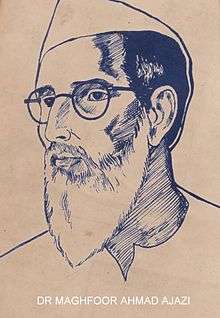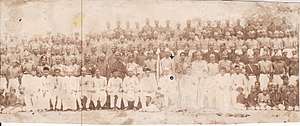Maghfoor Ahmad Ajazi
Maghfoor Ahmad Ajazi (1900–1966) was an Indian political activist from Bihar.
Maghfoor Ahmad Ajazi | |
|---|---|
 Maghfoor Ahmad Ajazi | |
| Born | 3 March 1900 Muzaffarpur, India |
| Died | 26 September 1966 (aged 66) Muzaffarpur, India |
| Nationality | Indian |
| Occupation | Political & social activist |
| Known for | Founder of All-India Jamhur Muslim League & Flag bearer for the cause of Urdu Language |
Early life
Ajazi was born on 3 March 1900 in village Dihuli, Block Sakra of District Muzaffarpur, in Bihar.[1] His father Hafizuddin Husain and grand father Imam Bakhsh were zamindars and his mother's name was Mahfoozunnisa. His maternal grandfather Reysat Husain was an advocate in Sitamarhi.[2]
He became a disciple of Ajaz Husain Budayuni, the Khalif of Hazrat Fazle Rahman Ganj Muradabadi, and assumed title of 'Ajazi'. He gained his patriotism from his father.
Ajazi's mother died in his childhood, while his father died in Lucknow during treatment and was buried in Chaar Bagh Qabristan when Ajazi was in school. His elder brother Manzoor Ahsan Ajazi was also a freedom fighter. He had only one sister, Noorun Nisa.[3]
Pre-Independence activism
Ajazi left his studies at B.N. College Patna to follow Mahatma Gandhi and joined the non-co-operation movement in 1921.[4]
Ajazi was in charge of North Bihar. Once he unknowingly reached the house of his cousin in a remote village. He inquired about 'Muthia'. He received a negative answer. His cousin recognised him and requested him to take meal, but he refused even a glass of water. When his sister promised to take out muthia and donated the dues, he agreed to take meal.[5]
He attended the AICC session held at Ahmedabad in 1921 and supported Mohani's motion on 'Complete Independence', which was opposed by Mahatma Gandhi and failed. He met Gandhi at Sabarmati Ashram. He joined Khilafat movement and became member of the Central Khilafat Committee. Thus he came into contact with Mohammad Ali Jauhar and Shaukat Ali and became their associate.
He represented the Central Khilafat Committee at the All Parties Conferences and All Muslim Parties Conferences on Nehru Report along with Maulana Shaukat Ali, Begum Md. Ali, Abdul Majid Daryabadi, Maulana Azad Subhani, Maulana Abul Mohasin Md. Sajjad and others.[6][7] On the direction of Md Ali Jauhar, he took charge of the Khilafat Committee Calcutta. He was arrested in a protest march led by Subhash Chandra Bose and was arrested and released. He obtained a degree from Calcutta Homoeopathic Medical College.
During the by-election of Abdul Bari, he was arrested and expelled from Purnia district. He was prosecuted for the 'Dihuli Conspiracy' and his office was searched. In August 1942, his house was searched, forcing him to work secretly, and his eldest son Muzaffar Husain Ajazi died on 25 July 1942.
After the earthquake of 1934, he and Rajendra Pd. devoted themselves to the relief operation. One night they had to sleep beneath a tree with their heads on a single brick.
Ajazi opposed Jinnah's two-nation theory [8] and the creation of a separate Pakistan. He founded the All-India Jamhur Muslim League to counter Jinnah's All-India Muslim League, and served as its first general secretary. Opponents used to come in batches to his residence, virtually spitting and shouting slogans.[9][10][11][12][13][14][15][16][17][18][19] [20][21][22][23][24]

Ajazi was also a poet and writer in the Urdu language as well as an orator. His papers, diaries, letters and files are preserved in the Nehru Memorial Museum & Library in New Delhi, National Archives in New Delhi and the Khuda Bakhsh Oriental Public Library in Patna.[25][26][27][28][29][30][31][32][33]
Post-independence activism
He was the chairman of the Urdu Conference of Muzaffarpur held in 1960, in which for the first time a resolution was passed demanding that Urdu be accepted as an official language in Bihar.[34] (After 15 years this demand became reality).[35][36]
Ajazi established Anjuman Khuddam-e-Millat, based on the pattern of Sir Syed's Educational society. This society established a school, renovated the Company Bagh Mosque of Muzaffarpur, now the biggest Mosque of this city, built a rest house, and undertook the last rites of unclaimed dead bodies.[37][38][39][40][41]
Death
Ajazi died on 26 September 1966. Acharya J.B. Kripalani said: "Dr. Ajazi was a great patriot, a devoted servant of humanity and a lovable friend. Selfless patriot like him are becoming rare. His death is a loss to society". Fictionist and journalist Kalam Haidry and novelist and journalist Moin Shahid called him "Baba-e-Urdu, Bihar" (Father of Urdu in BIhar) for his services towards Urdu language. Journalist and poet Wafa Malikpuri described him an old 'Mujahid' (crusader) for Urdu language.[42][43][44]
References
- Sajjad, Mohammad. "Maghfur Aijazi: A freedom-fighter and a builder of Indian democracy". TwoCircles.net. Retrieved 5 March 2015.
- Bihari Lal Fitrat (1883) AAin-e-Tirhut published from Bahar-e-Kashmir Press, Lucknow, republished with translation by Mahrajdhiraj Kameshwar Singh Kalyani Foundation, Darbhanga-2001
- AMU, Aligarh's Organ "Tahzib-ul-Akhlaque" started by Sir Syed Ahmad Khan, Feb. 2004, p. 49
- The Immortals By Syed Naseer Ahmed -Azad House of Publications, Guntur (AP), 2014
- Bihar Vibhuti-Vol. iii-Bihar Abhlekhagar, Govt. of Bihar--2014
- He undertook a preparatory course in Social Science at Elim University Sikkim.
- Reneissance Law CollegeIndore B.A,LLB(Hons)2nd.Sem.HIstory Unit-1
- India, eleventh to twenty first century|url=https://books.google.com/books?id=i1mdAAAAMAAJ%7Caccessdate=7 February 2013|date=1 January
- IAS 100 by Chronicle
- The Expression International e-journal,vol.2,issue-1
- S. M. Azizuddin Husain; Jamia Millia Islamia (India). Madrasa educat2005. Kanishka Publishers, Distributors. ISBN 978-81-7391-741-7.
- Sir Syed Ahmad Kahn:Vision and Mission Delhi: Manohar, 2008, pp. 181–197
- Terrorism is Comes from US, Barath Kumar PKT, published by A. Palanivelu
- Muslim Freedom Fighters Of India By Mohd.Talat Aziz
- South Asian History And Culture Routledge, London, Vol. 2, pp. 16–36. ISSN 1947-2498, Taylor and Francis Group
- Islam and the modern age-volume 33-pp.69 & 84/books google.co.in/books?id=JNPXAAAAMAAJ & igRRAQAAIAAJ-2002
- NMML Manuscripts:an introduction-p.120/books.google.co.in/books?id=MgduAAAAMAAJ-2000
- Builders Of Bihar By Dr. Syed Ahmad Quadri-2008-pp 61–63
- World HeritageEncyclopedia,ID:WHEBN0038065375
- The Muslim Heroes Of Bihar By Fakhruddin Ahmad Nishter-2013-pp 34–36
- Monograph on Dr. Maghfoor Ahmad Ajazi by Dr. Farooque Ahmad Siddiqui Published by Bihar Urdu Academy, Govt. of Bihar, Patna, 2010
- Bihar District Fact Book,Muzaffarpur District
- Preparatory Course in Social Science published by Jharkhand Rai University p170
- Bihar-DavisHunter.com-p.8/15 http://www.davishunter.comv/home/place/Bihar
- Nehru Memorial Museum and Library, New Delhi, 16th Annual Report, 1981–82, p.9
- Nehru Memorial Museum and Library New Delhi, 27th Annual Report 1992-93,p.13
- National Archives, New Delhi F NO.4(3) 1/92 PA
- Khuda Bakhsh Oriental Public Library Patna Acc. No.2209
- About Islamic World in Medicine, Quran, Translation
- Bihar Govt. Magazine "Bihar"Republic Day Spl.2002, p67
- Contesting Colonialism and Separatism: Muslims of Muzaffarpur Since 1857 http://www.primusbooks.com/showbookdetail.asp?bookid=71
- Lahu Bolta Bhi Hai by Shahnawaz Ahmad Qadri & Krishna Kalki, pp. 197 - 98
- Josh General Knowledge
- Huma Urdu Digest Delhi, Urdu Number
- Muslim Politics in Bihar Prof. Md. Sajjad AMU Published by Routiedge 2014
- http://wwwbihartimes.in/articles/sajjad/muzaffarpur.html%5B%5D
- twocircles.net/../maghfur_aijazi_freedomfighter_and_builder
- Afkar-e-Milli, New Delhi, Spl. Bihar Issue, July, 2000, p254
- http://www.muzaffarpurtimes.com/sajjad.htm%5B%5D
- http://www.biharanjuman.org
- English Daily The Times Of India. Independence Day Issue
- Bihar Govt. Magazine "Bihar", March, 2005, p38
- Muslim Freedom Fighters Of India,By Syed Obaidur Rahman,Published By M/S Global Media Publications
- Remembering Muslim Makers Of Bihar By Mohammad Sajjad For Bihar Collective,Brown Books, New Delhi,pp150-158